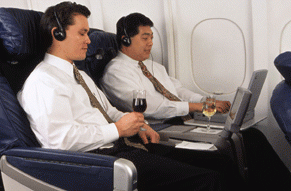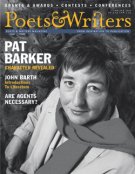When it comes to getting poetry into unexpected places, the sky's the limit for Billy Collins. Last fall the former United States poet laureate and author of eight books of poetry, including The Apple That Astonished Paris (University of Arkansas Press, 1988), Picnic, Lightning (University of Pittsburgh Press, 1998), and Nine Horses (Random House, 2002), partnered with Delta Air Lines to create an audio program of poetry to be offered periodically to passengers on its entire fleet of airplanes. "It's one thing to sit in your study with a book of love poems and your cocker spaniel beside you. It's another to be ambushed by poems," he says.

To get his idea off the ground, Collins mentioned his plans for the program during the many interviews he gave as poet laureate. "Eventually I got a call from Danette Christine, a producer at SoundTrack Marketing, the company that provides audio content to Delta. And she told me they'd like to pursue the idea." According to Christine, after the 9/11 attacks Delta wanted to offer passengers a relaxing program. SoundTrack Marketing came up with "The Art of Relaxation," which featured yoga masters, massage therapists, psychologists, and occasionally poets whose work, Christine says, was more inspirational than literary. "But the program was a bit boring, so we did away with it," she says. "Then I heard Billy Collins on NPR talking about his idea for an in-flight poetry program, and I tracked him down."
Collins has so far recorded one program of poetry and is now recording a second, scheduled to take off this month. Each 45-minute program features work by contemporary poets, read by Collins, interspersed with jazz music. The theme for the first program was love; the second program is devoted to poems about animals.
Featured poets, in addition to Collins, include Stephen Dunn, Sherod Santos, Miller Williams, Jane Hirshfield, J.D. McClatchy, David Lehman, and Robert Wrigley. Collins says he tries to select poems that are "fairly short and fairly clear, delivering pleasure in one hearing." The jazz pieces, which he characterizes as "not too alarming and relatively peaceful," are performed by such jazz greats as Dave Brubeck, Miles Davis, and Chet Baker.
"We try to find music that captures the spirit of a poem, so that you hear a poem and linger on it while the music plays," says Christine. "And Billy's reading style has a bebop feel to it, which creates a very mellow feeling." Christine says that feedback from passengers has so far been very positive. "People have sent e-mails saying that they like seeing a cultural program on the plane, that the music and the poetry complement each other, and that Billy Collins is very easy to listen to."
But some passengers have admitted to being quite confused, Collins jokes. "One woman was flying from Istanbul to New York. She wanted to watch a movie—I think it was The Matrix Reloaded—but had accidentally tuned into the poetry channel. So the movie began while she was listening to a poem by Stephen Dunn. She thought, 'Oh, how ingenious, an action movie that begins with a poem.' Then she realized she had made a mistake. Thankfully, she stayed tuned to the poetry channel."
Of course, the program's success may be due to the fact that air travelers are a captive audience, but Christine says an airplane is the perfect place to surround people with poetry. "When you're on a plane, you don't have responsibilities. You don't have to answer e-mails and your cell phone doesn't ring. You can sit back and put your mind in a different gear."
Collins says he considers the poetry channel, which he launched during his last month as poet laureate, to be among his three most important contributions during his tenure. The other two are Poetry 180, a program encouraging high school students to read one poem every day of the school year, and his poem "The Names," which he wrote after 9/11 and read during a special joint session of Congress on September 6, 2002.
When asked about his successor, poet laureate Louise Glück, author of 10 volumes of poetry, including the Pulitzer Prize–winning The Wild Iris (Ecco, 1992), he says, "I'm all for her. She may have a different temperament than I do, and she may not be as acrobatic as I was in her role as poet laureate. But that's the great thing about the job: You can tailor it to your own personality."
Dalia Sofer is a freelance writer who lives in New York City.








